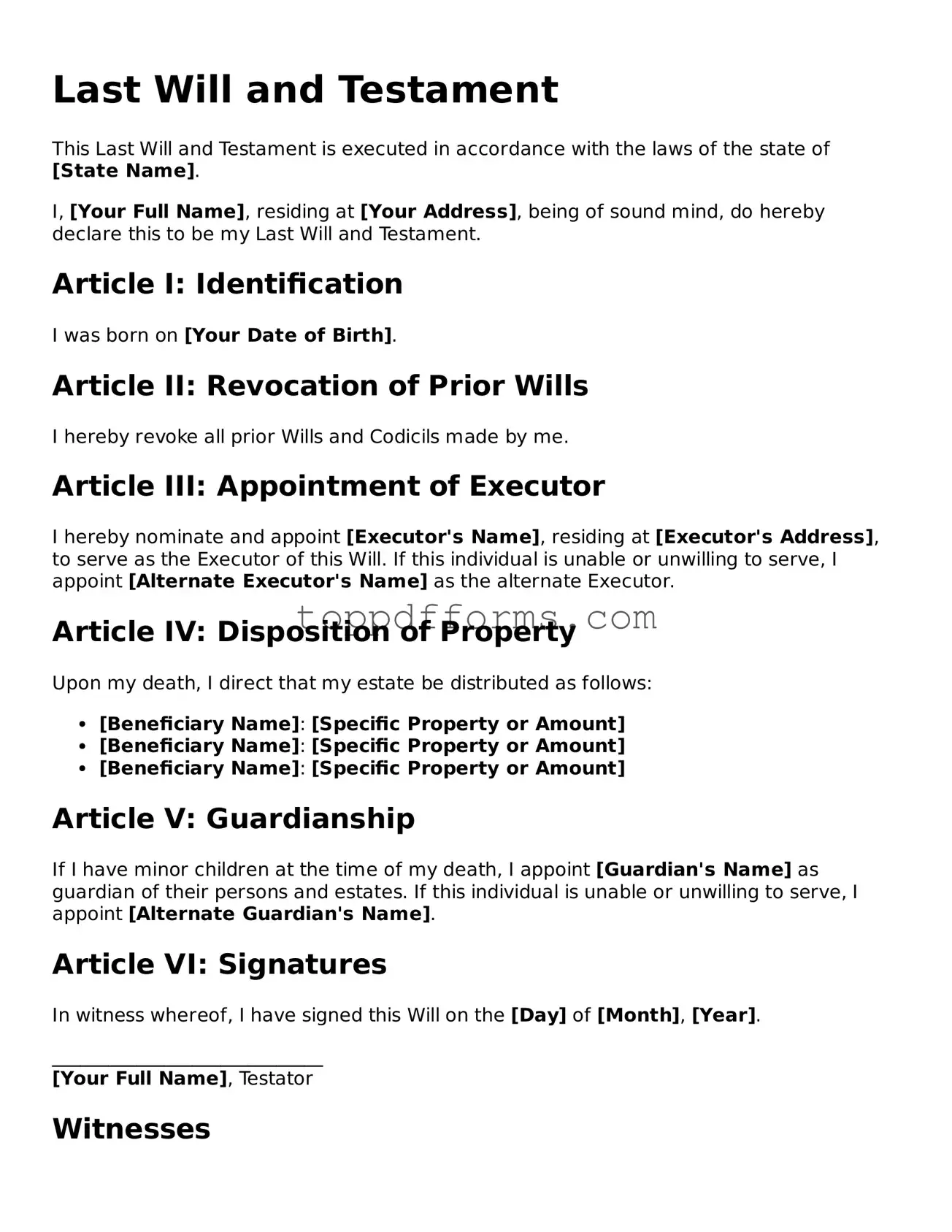Free Last Will and Testament Template
State-specific Guidelines for Last Will and Testament Documents
Last Will and Testament Form Categories
Things You Should Know About This Form
What is a Last Will and Testament?
A Last Will and Testament is a legal document that outlines how a person’s assets and affairs should be handled after their death. It serves as a guide for your loved ones and the courts, detailing your wishes regarding the distribution of your property, the care of any minor children, and the appointment of an executor to manage your estate. Having a will can provide peace of mind, ensuring that your wishes are respected and reducing potential conflicts among family members.
Do I need a lawyer to create a Last Will and Testament?
While it’s possible to create a Last Will and Testament without a lawyer using online templates or software, consulting with a legal professional is often beneficial. A lawyer can help ensure that your will complies with state laws, which can vary significantly. They can also provide personalized advice based on your unique situation, helping you navigate complex family dynamics or specific wishes that may require additional legal considerations.
Can I change my Last Will and Testament once it’s created?
Yes, you can change your Last Will and Testament at any time, as long as you are of sound mind. This process is known as amending your will, and it can be done by creating a new will or by adding a codicil, which is an amendment to the original document. It's important to follow the same legal formalities when making changes, such as signing and witnessing the document, to ensure that your amendments are valid and enforceable.
What happens if I die without a Last Will and Testament?
If you pass away without a will, you are considered to have died "intestate." In this case, state laws will determine how your assets are distributed, which may not align with your wishes. Typically, your estate will be divided among your closest relatives according to a predetermined formula. This can lead to unintended consequences and family disputes, making it even more crucial to have a will in place to clearly express your desires.
PDF Overview
| Fact Name | Description |
|---|---|
| Definition | A Last Will and Testament is a legal document that outlines how a person's assets and responsibilities will be distributed after their death. |
| Requirements | Most states require the will to be signed by the testator and witnessed by at least two individuals who are not beneficiaries. |
| Governing Law | The laws governing wills vary by state. For example, in California, the California Probate Code regulates the creation and execution of wills. |
| Revocation | A will can be revoked by the testator at any time, typically by creating a new will or by destroying the existing one. |
| Probate Process | After a person passes away, their will must go through probate, a legal process that validates the will and oversees the distribution of assets. |
Common mistakes
When completing a Last Will and Testament form, individuals often overlook key details that can lead to complications later. One common mistake is failing to properly identify the beneficiaries. It is crucial to clearly state the full names of those who will inherit your assets. Simply using nicknames or vague descriptions can create confusion and disputes among family members.
Another frequent error involves not signing the document correctly. A will must be signed in accordance with state laws to be valid. Some people forget to sign their will altogether, while others may not have the required number of witnesses present during the signing. This oversight can render the will invalid, leading to unintended distribution of assets.
Many individuals also neglect to update their wills after major life events. Changes such as marriage, divorce, or the birth of a child should prompt a review of the will. Failing to make these updates can result in outdated information, which may not reflect your current wishes regarding asset distribution.
Additionally, people often make the mistake of not being specific about how they want their assets distributed. Vague language can lead to misunderstandings. Clearly outlining who receives what can help prevent disputes and ensure that your wishes are honored.
Finally, some individuals may overlook the importance of discussing their will with their loved ones. While it might seem uncomfortable, having open conversations about your intentions can help manage expectations and reduce conflicts after your passing. Transparency can foster understanding and respect among family members, making the process smoother for everyone involved.
Common Documents
Intent to Purchase Agreement - The letter serves to document any preliminary agreements made during initial discussions.
The Chick-fil-A Job Application form is a document that potential employees use to apply for positions within the renowned fast-food chain. This form allows applicants to provide their personal information, work history, and availability, which helps the company assess their qualifications. For those interested in applying, it is convenient to access the form through My PDF Forms, making it easier to begin the process of becoming part of a team that is known for its customer service and community involvement.
Texas Hub Certification - Capture member contributions over time for future reference and planning.
Fedex Fright - Each shipment's weight and package descriptions must be clearly stated.
